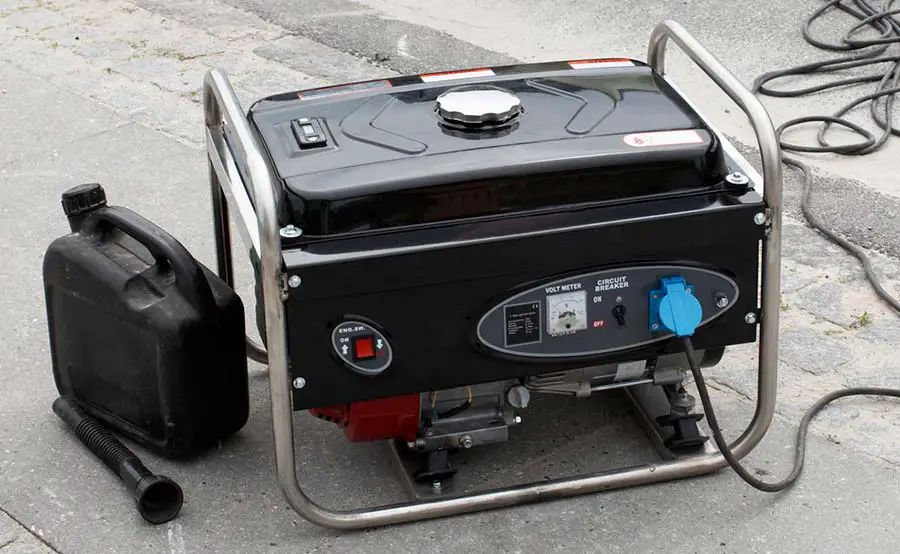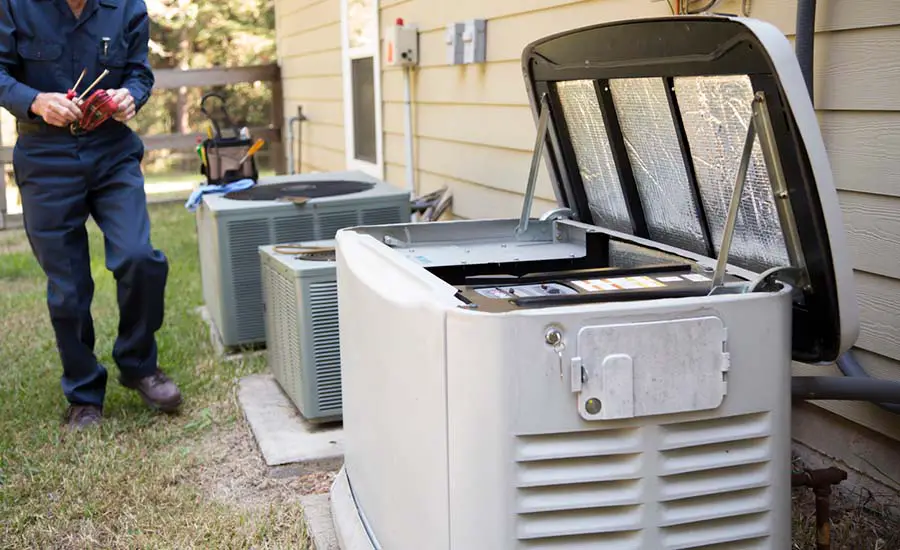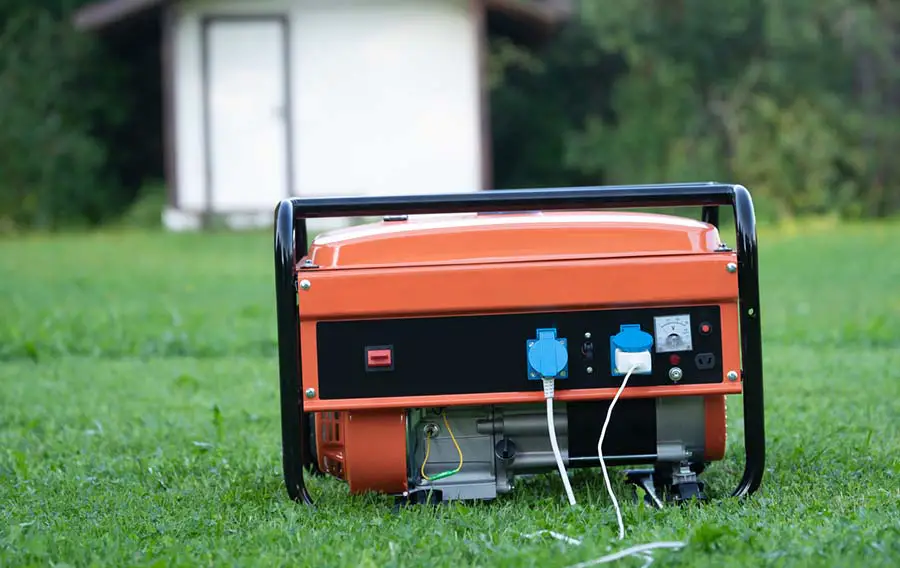
When you have your generator installed, serviced, plugged in, and running with a breeze, you will soon start facing the universal challenge. Your generator will not be fuel-efficient, consuming fuel so fast that you can barely manage to keep it full when you need it.
To reduce fuel consumption on your generator, you need to keep the generator serviced, provide it with fresh air to combust, and ensure the coolant is at the right temperature. Further, you must only use the machine when needed while ensuring that it is never under or overloaded.
Doing any of these sounds relatively easy in principle; however, knowing the right temperatures when the machine is under too much load or when to use it requires some knowledge. We recommend that you familiarize yourself with the basics of how to reach top efficiency.
How To Make a Generator More Fuel Efficient While It Runs
While servicing the generator will quickly help ensure that it is always fuel-efficient, you need to work further to help the machine work better. You can do several things that will automatically have the generator run more efficiently when using the generator.
Using the generator properly while running will allow it to use a lot less fuel overall, with many owners mistakenly thinking they can just run the machine without care. However, it is essential to note that the generator will properly run if you use it for its intended purpose.
1. Control the Load
Overloading is easily one of the main reasons a generator may not be running in a fuel-efficient way. When you are placing too much load on the generator, the engine instantly kicks up to the fastest it can go, using as much fuel as it can handle at that specific moment.
Ensuring that you are not constantly overloading the generator will allow you to comfortably get the maximum efficiency from the machine. Once you know your generator, you’ll find a sweet spot where the fuel efficiency is good while also handling a sizable load.
2. Provide Enough Air and Ventilation
This may seem obvious if you know how a generator operates, but providing it with a constant air supply is essential. If the generator cannot get fresh oxygen to assist in the combustion process, the engine will naturally become inefficient.
Ironically, this is why a generator at sea level runs more efficiently than a generator on a mountain. The more fresh air the generator has, the less fuel it needs to burn to cause combustion, causing less fuel waste as combustion takes place.
3. Use the Correct Fuel
We have seen many people decide to use the cheaper fuel to overcome the costs they need to pay when using their generators. However, this causes the machine to be less efficient overall, causing you to buy more fuel than you usually would have, costing you even more.
Every generator has a specific fuel type that will work the best in it, and using this fuel type will allow your generator to run at top efficiency comfortably. More efficient fuel causes the generator to run hot, while less efficient fuel causes the machine to use more fuel on each stroke.
4. Don’t Underload
The conscious generator owner will constantly be checking how much load they are placing on their generator. Ironically, this can backfire and cause your generator not to have enough load placed on it to be efficient, causing the machine to use more fuel to keep going than it would under load.
The engine in a generator has to use more fuel when it is closer to idle to keep going than it would when going at the right speed. This is because as the generator keeps going, the required fuel to keep the machine going at a steady pace may decrease, causing unspent fuel to be exhausted.
5. Only Use Your Generator When Needed
Possibly one of the biggest things that you need to learn when owning a generator is that it is most efficient when it is not running at all. Generators are there to provide emergency power, never to provide constant power, even when they are the only source of power for your remote home.
Using a generator only when needed is easily one of the best ways to ensure that you are not wasting fuel to power a few lights. It may seem counterintuitive, but the generator should only be on when you need to bathe, cook, or even clean a house, and off otherwise.
How Good Generator Maintenance Improves Fuel Consumption

We need to look at how just keeping the machine well serviced will improve the overall efficiency that it can deliver. Many people assume that servicing makes the engine last longer; however, it also enhances efficiency.
To understand how servicing the engine will improve the overall efficiency, we need to look at how each part of the service improves efficiency. You can take each of these steps when servicing your engine to ensure that it will use a lot less fuel overall, improving your power delivery.
Cleaner Burns
Replacing the filters, providing cleaner oil, and doing a general service will allow the machine to work easier, causing cleaner burns overall. When an engine has a clean burn, all the fuel has been burnt up instead of having combustion where only half the fuel burnt.
When the fuel is not burnt correctly with each engine’s stroke, it means that you will have unspent fuel pushed out the exhaust. Causing your machine to waste fuel as it is not burning correctly, creating less energy with each stroke as the machine continues to operate.
Smoother Strokes
When servicing your generator, it is good to check how well the pistons can move inside its engine. You want the motion to be as smooth as possible, with no rubbing or wear and tear between the sides of the piston and the sides, which can cause more work from the machine than necessary.
To ensure that the pistons, the crankshaft, and the valves are moving smoothly, you may have to remove a few parts, cleaning them as you go. With some older generators working a lot better after being bored, they simply get everything back to being perfectly round.
Less Wear And Tear
The more you service your generator, the less overall wear and tear it will suffer, ensuring that the metal parts are touching as little as possible. Overall, the engine’s wear and tear determine how much damage occurs when you operate your generator.
Many people forget about this, assuming that the engines will continually work at peak efficiency, never undergoing wear and tear. However, after a year of running, the engine will sustain damage simply because it has been running, requiring that you take the time to fix parts for top efficiency.
Easier Operation
A well serviced and maintained generator is simply working easier, with the machine not having to fight itself when trying to operate. When oil is old, the filters are clogged, and the gas is wrong, the generator will constantly work against this.
Because of this, a serviced generator works more efficiently, consuming a lot less fuel overall as it can comfortably produce power. We have seen many people complain about efficiency when their engine has to work through literal sludge to continue operating.
Temperature Control
When you are servicing your generator, you will also be aware of how the temperatures of the engine have fluctuated over time. A generator that is too hot will burn too much fuel, while a generator that cannot reach the right temperature will not burn its fuel.
This is why you need to ensure that the generator can maintain its perfect temperature, checking the oil and the coolant when you service the generator. The best way to improve efficiency is by simply having the engine running as hot as it needs to each time.
Engine Cleans
Depending on the generator you have, there will be a buildup of carbon and other materials inside the pistons. When servicing the generator, you can check on these buildup levels, deciding when to clean the engine.
Usually, you can spray in some engine cleaner to have the inside of the piston heads cleaned up through a chemical reaction. However, it would help if you took the time to open up the piston block every few years to check on the engine, deciding how to best clean it from there.
When To Use a Generator for Best Fuel Efficiency?

We recommend only running the generator in the early mornings and after 3 pm when the sun has started setting for the best heat efficiency. Only running it long enough to clean yourself, clean the house, and cook food when needed.
This is the most likely time of the day and night that you will need power during these times when air is cool enough that the machine won’t quickly overheat. The biggest enemy of a generator’s fuel efficiency is freezing outside at night or boilingly hot at noon.
Apart from the temperatures, you should only use the generator when you need it; during the day, the generator should not be running when you can work from a laptop. Further, at night apart from bathing and cooking, you should plan to spend your time reading or being on the phone.
External Generator Additions to Help Improve Fuel Efficiency
When working on your generator’s total fuel efficiency, we must consider the possibility of changing how things are drawing power from the machine. Many people plug the machine in and seem to forget about it until it starts becoming expensive to run.
However, there are several things that you can do to increase the total efficiency of the generator by simply adding them. Adhering to the right way of working with the generator, having a proper way to draw power from it, and being efficient overall will easily allow you to use a lot less power.
External Battery Pack
An often-forgotten system that you can install between your generator and your home is a battery system with a solar-powered system. This means that the generator needs to charge the batteries when they start running empty, drastically decreasing the total power required.
A proper battery power pack designed for your home can usually run several hours, sometimes days, without needing power. When the generator does need to run, it is just a few hours to recharge the batteries instead of powering your entire house.
Efficient Appliances
It may sound like a broken record at times, but the more efficient the appliances in your home, the less power you will need in total. This means for a generator that more efficient appliances will comfortably allow you to run your generator at a lower speed.
A generator that constantly supplies the maximum amount of power that it can provide will always use a lot more fuel than you could expect. Having appliances, lights, and everything else that does not cause you to reach this limit will allow your machine to run as efficiently as possible.
Controlled Use
You must ensure that the generator is not used to power just the lights of your home; if you are going to be relaxing with a phone on the couch, then the generator is not needed. A lot of people make the mistake of running the machine when it is not needed at all.
Usually, you will see a significant decrease in efficiency if you use a generator for a task where a battery bank would have been sufficient. We always recommend that you ensure the machine is only running when absolutely necessary.
What Is the Best Way To Increase the Fuel Efficiency of a Generator?
There is no magic way to increase fuel efficiency; unlike car engines, these machines are already as efficient as they can be. Adding turbo’s or other parts onto the generators may help with short-term efficiency but greatly damages the overall lifespan of the machines.
The only way to ensure that the machine is always working the best is to ensure that it has fresh air, a good fuel supply, and is well-maintained. This will easily ensure that the machine correctly runs when you need to use it and allowing it to run as required.
We have seen many machines that could barely start before being serviced, using almost double the fuel it needs, working perfectly after the service. A machine that you have not serviced in a while will only work efficiently once maintained.
Which Types of Generators are the Most Efficient?

Before purchasing a generator, we recommend considering how you will use it to power the items in your home. Each type of generator will be efficient in an entirely different way, requiring that you consider them before simply deciding to install them.
An emergency backup generator for offices is vastly different from a generator needed for a 2-bedroom house. In comparison, people living in the middle of seemingly nowhere need to think more long-term, without a constant and stable supply of gas that they can use to refuel their machines.
Diesel Generators
You can find these are the most significant generators, usually being installed in office blocks to power them when the worst happens. Their large size and the overall lower speeds the engine needs to turn greatly affect their efficiency, even when using the best diesel.
Diesel generators are some of the most efficient generators when measuring how much fuel is they use per kilowatt. They provide an immense amount of power, allowing you to use them the same way you use average power from the grid, with these generators rarely reaching their peaks.
Gasoline Generators
The most common generator you can find and the one we would recommend you use when you need an emergency generator. Easily one of the loudest generator types out there, these machines can run on normal gas you would use in your car.
These generators are not the most efficient, only providing a limited amount of power and requiring more maintenance than other generators. However, they are small enough to be loaded onto the bed of most trucks, are accessible to service, and are relatively inexpensive.
Natural Gas Generators
Depending on your location in the world, these are easily the most efficient generators for cost per kilowatt. These are the generators preferred by people living in the United States and Canada due to the low cost of natural gas in these countries.
However, they have a higher initial installation cost and can be a lot more expensive as they will empty a natural gas tank within a few hours. Further, these generators produce less power when compared to their same-sized gas generators.
Solar Power
We include this because many higher-end power installations have solar power added extra to their emergency power situations. Solar power will always be the most efficient after the initial installation costs; there will be almost no cost to getting power, as the sun provides free energy.
However, it’s important to note that you will have to cover a large area with solar panels to power your house and that the batteries will only have a lifetime of 4 to 6 years. We always recommend still saving up the money you would have spent on fuel to purchase better batteries when the time comes.
Can a Generator Be 100% Fuel Efficient?
No engine on earth is 100% efficient, with only a few recent engines reaching close to 35% efficiency. The challenge is that converting the potential energy held in gas to electric power has many byproducts that suck up the potential energy.
This means that the pistons’ movements, the combustion of the fuel, and the eventual movement of the motor to produce electricity all soak up power. The engine heats up due to the energy created during combustion, and the wires also absorb heat.
Just the movement of electricity through the copper wires into your house causes some power to be lost. This is why engines that run colder are prized so much, with engines that require almost no external heat being so amazing; however, internal combustion is incapable of being 100% efficient.
Why Does a Generator Use More Fuel When Underloaded?
All generators are designed to carry a load, with most being the most efficient at 70% to 100% load when in operation. As the load decreases, the generator runs too rich, adding too much fuel for the amount that is being combusted, not letting enough air in, and clogging the pipes.
The technical problem goes further, with the power generation side of the machine not being turned fast enough to provide a constant flow of power. While the engine is not running fast enough for everything to be properly oiled, heated, and burning, causing materials to burn on.
We have seen many generators that were never running at full speed reach their end of life almost twice as fast as other generators of the same age. A machine designed to run at full speed that only ever runs at half that speed will sustain damage simply because it never reached its full potential.
Conclusion
We have seen many people try to do something amazing or out there to get their machines as efficient as humanly possible. However, as they soon learn, this can cause long-term damage; instead, properly maintaining and running the generator will result in the best fuel efficiency.
Whatever you do, please don’t think that starving the generator of air and fuel will somehow make it use less of both!
